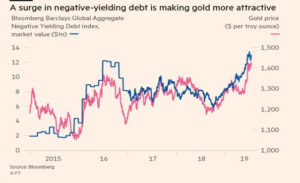Market Action
Global equities saw little change this week, but the yield on the US 10-year Treasury note dropped 8 basis points to 2.05%. The price of a barrel of West Texas Intermediate crude oil fell almost $5 to $55. 60 while volatility rose from 12.7 to 13.3, as measured by the Chicago Board Options Exchange Volatility Index (VIX).
On Thursday, the president of the Federal Reserve Bank of New York and the vice chairman of the Federal Reserve Board made comments that raise the expectation of the central bank making aggressive rate cuts at the end of the month. New York Fed chief John Williams said “It’s better to take preventative measures than to wait for disaster to unfold”, urging policymakers to act quickly to ease policy as economic growth slows. Vice Chairman Richard Clarida expressed his agreement with Williams by saying cutting interest rates quickly is a good strategy. Due to these recent comments, the probability of a 50-basis-point rate cut swelled to 70%, based on futures markets. The New York Fed issued a statement on Thursday to clarify that Williams’ remarks were not meant to address the present situation but were purely academic in nature. As of Friday, futures markets are fully pricing in a 25 basis point rate cut and a 41% probability of a 50 basis point cut on July 31st.
The US government is projected to run out of cash in early September and Congress is about to recess for the month of August, therefore, time is running out for congressional Democrats and the White House to reach a compromise that would raise the nation’s statutory debt cap while funding the government for the next two years. US Secretary of the Treasury Steven Mnunchin, Speaker of the House Nancy Pelosi, and Senate Majority Leader Mitch McConnell reached an agreement late this week on topline spending levels for the next two years. Offsets to increases in discretionary spending meant to limit the growth of the federal budget deficit are still to be worked out, but both sides hope to reach an agreement Friday.
The European Parliament has approved former German Defense Minister Ursula von der Leyen as president of the European Commission. Managing director of the International Monetary Fund, Christine Lagarde, resigned her position, effective September 12th, to prepare for her confirmation as president of the European Central Bank.
The Chinese economy grew at its slowest rate in 27 years this quarter, growing at an annual pace of 6.2% as compared to the 6.4% rate posted in the first quarter.
The British Parliament voted today to block any possibility that presumptive British Prime Minister Boris Johnson could suspend parliament in the days leading up to the 31 October Article 50 deadline for the United Kingdom to leave the European Union. Johnson is expected to be announced as the winner of the Conservative Party on Tuesday. He is thought to be encouraging the possibility of a no-deal outcome in order to pressure the European Union into renegotiating the Withdrawal Agreement.
With the expectation that the US Federal Reserve and European Central Bank will cut rates in the coming weeks, several emerging market central banks have cut rates. The Bank of South Korea cut its repo rates for the first time in three years, by a quarter of a point to 1.50%. The Bank of South Korea also lowered its inflation forecast to 0.7%. Central banks in Indonesia and South Africa also cut rates amid declines in economic growth.
Iranian Foreign Minister Mohammad Javad Zarif told reporters on Thursday that Iran was willing to accept enhanced inspections of its nuclear program in exchange for the lifting of US sanctions. The US has said that Iran must meet 12 conditions to receive sanctions relief, but Iran has continued to reject US demands.
What Could Affect the Markets in the Days Ahead
Trade negotiations between the US and China seemed to have stalled again. Negotiations were held by conference call this week but no plans have been made for a face-to-face meeting. The US continues to push back against China’s state capitalism model while China is working to maintain access to the US market for companies with close ties to its military. US President Donald Trump said this week that there is still a long way to go in securing a deal with China and that it is possible the US could impose tariffs on an additional $325 billion in Chinese exports to the US.
Oil futures rose 1.4% to $56.19 overnight as President Trump announced that the US Navy downed an Iranian drone that flew too close to the USS Boxer in the Strait of Hormuz. Friday afternoon, Iran reported it had seized a British-flagged oil tanker in the Strait of Hormuz further escalating tensions between Iran and the West. However, benchmark crude prices are on track for their biggest weekly decline and the IEA does not expect oil prices to rise significantly because demand is slowing.
With 15% of the constituents of the S&P 500 Index having reported for Q2 2019, blended earnings per share, shows that earnings growth is running at a -2% year-over-year pace. Revenues are seen rising 3.8% compared with the same quarter a year ago, according to FactSet Research. While results so far this earnings season are running slightly ahead of forecasts, many companies are warning of slowing economic growth and the negative impacts of tariffs on their businesses.
This Week from BlackSummit
Recommended Reads
Video of the Week
Apollo 11: ‘I helped the world watch Moon landing’

